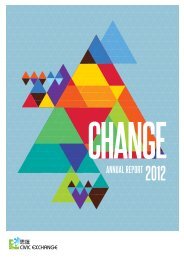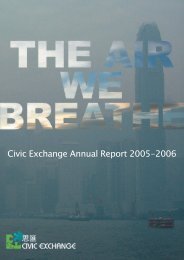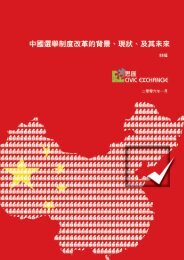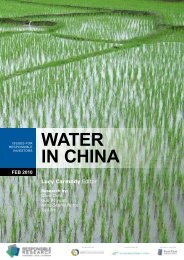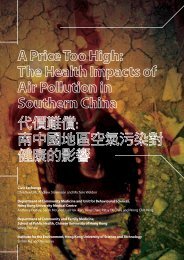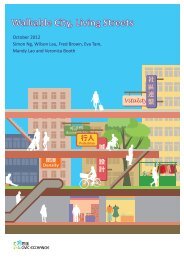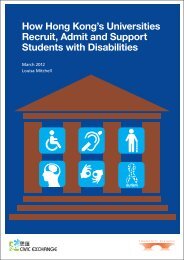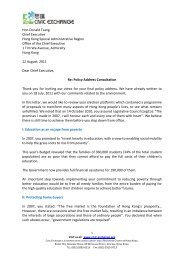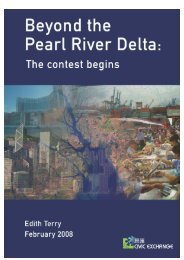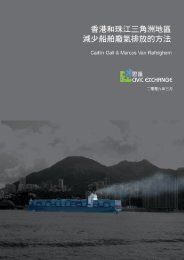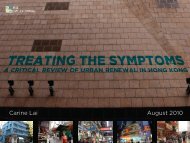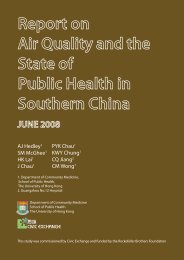Untitled - Civic Exchange
Untitled - Civic Exchange
Untitled - Civic Exchange
You also want an ePaper? Increase the reach of your titles
YUMPU automatically turns print PDFs into web optimized ePapers that Google loves.
Chapter 7: The Dynamics of Decision-making in Hong Kong<br />
1. The political system gives overwhelming authority to the executive branch, which has resulted in<br />
an "executive-led" system of government in Hong Kong. This will not change with the<br />
implementation of the POAS. 234<br />
2. Key decision-makers are the elite "Administrative Officers" (AOs), who are generalist bureaucrats<br />
effectively doubling up as ministers. Civil servants dominate all major policy processes, including<br />
policy initiation, formulation, and implementation. The POAS will create a new political elite.<br />
However, since it is anticipated that many of the initial appointees will come from the senior ranks<br />
of the civil service, existing organizational structures and decision-making practices are unlikely<br />
to change in the short-term.<br />
3. The administrative culture of the Hong Kong civil service and the training of civil servants impact<br />
the way that decisions are made. The top-down and compartmentalized structure of the bureaus and<br />
departments does not encourage a multidisciplinary approach. This problem is further exacerbated<br />
by an internal culture where different bureaus and departments avoid "interfering" with each<br />
other's decisions. While officers from different units of the administration may coordinate with<br />
each other, there is little effective joint decision-making at the important stages of policy<br />
formulation. 235 In implementing the POAS, the Chief Executive has pushed for closer coordination<br />
of policy portfolios. Although the ministers will all serve on the Executive Council - a step in the<br />
right direction - effective coordination will occur only if policy objectives, goal setting, and<br />
organizational structures and practices are properly aligned.<br />
4. The bureaucratic-administrative system sometimes results in a lack of competency at the highest<br />
levels of government. AOs change jobs every few years and, more often than not, are transferred<br />
into areas where they have no previous experience. Over the course of a five-year period, it is<br />
possible that all of the key officers within a bureau will change. This means that it can be hard to<br />
retain experience and institutional memory, as each new officer has to learn on the job. The POAS<br />
will create a non-political civil service in which permanent secretaries serve as administrative<br />
bureau heads and provide support to political appointees. It is unclear at this stage whether there<br />
will be complementary changes in the administrative system to develop the policy expertise<br />
required for a new governance system.<br />
5. The argument in favor of the existing system is that while AOs are generalists, they are supported<br />
by departmental officers who are specialists. At the departmental level, the training has been to<br />
implement policies rather than initiative them. In theory, generalists and specialists should make a<br />
strong team but in practice, they often do not, and the differences in approach can be a cause of<br />
internal conflict and contention. The POAS is unlikely to change this situation in the short-term.<br />
6. There is an urgent need to review Hong Kong's transport planning process and locate it within<br />
overall planning for sustainable development. The executive branch also needs to ensure that there<br />
is a meaningful connection between the planning and implementation of transport decisions,<br />
including the funding and pricing of transport. Opportunities to be more creative in developing and<br />
funding transport for the benefit of the community at large are being missed.<br />
234 This system is derived from a colonial system in which the government was not elected to office and where<br />
there were no real politicians. As such, the civil service was in fact the ruling party and played a political as well as<br />
administrative role.<br />
235 For example, for years the Transport Department (TD) and the Environmental Protection Department (EPD)<br />
used different standards to test vehicular smoke emissions. It was only after intense criticism in the legislature that<br />
they adopted a common standard in July 2000.<br />
73



